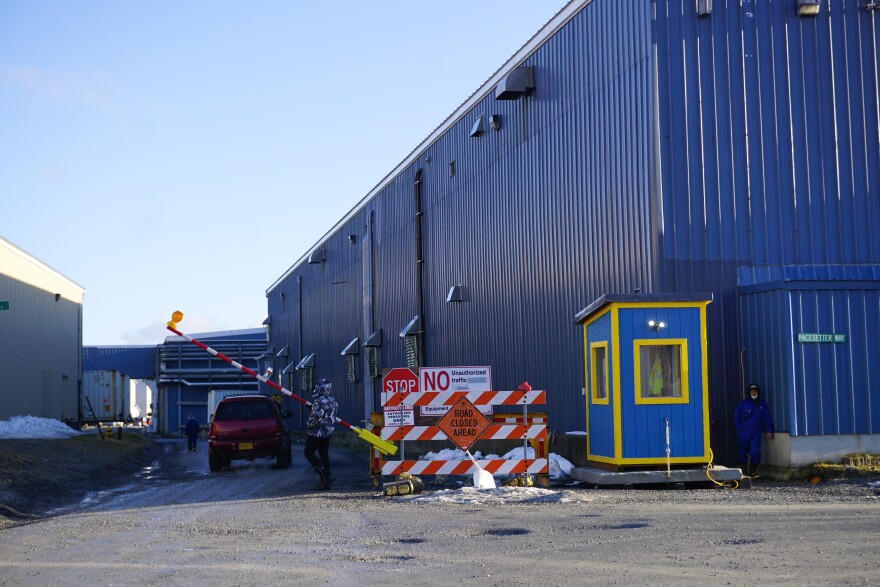Unalaska's largest fish processing plant reopened Monday after a COVID-19 outbreak forced it to shut down for almost a month.
UniSea closed its doors Jan. 5 after a handful of workers tested positive for the virus, following a New Year's gathering in company housing.
Since then, 66 of UniSea's more than 900 workers tested positive for the virus, according to UniSea President Tom Enlow. Seventeen of those were during their two-week entry quarantine, and 49 were non-travel related cases, he said.
"The virus has not been eliminated just yet," Enlow said in an email. "We have active cases in isolation that we are monitoring and close contacts in quarantine that we are continuing to test. But we feel very good about our response to the outbreak and containment thus far."
The reopening is a bright spot for the Bering Sea fishing industry, which has been hampered by COVID-19 outbreaks at multiple boats and onshore plants.
UniSea's processing plant has a year-round workforce, and its facility handles multiple species, from cod to crab. The shutdown came just as it was gearing up for one of its busiest times of the year: the lucrative winter fishing season for pollock, which goes into products like fish sandwiches, fish sticks and sushi.
The pollock season opened Jan. 20, but the 11 boats that typically deliver their catch to UniSea have been able to hold off, Enlow said.
That's because the pollock fishery operates as a cooperative, where vessels have a fixed quota of fish they can catch and deliver to a specific plant. Crews that don't catch their quota now can still catch it later in the season, industry officials say.
"Our fleet have been extremely supportive of our situation and patient with our reopening schedule," Enlow said. "But they, like UniSea, are anxious to get the season started."
Despite "gaining ground on containment" and restarting operations, UniSea will continue to test its workforce every three days until no one tests positive for the virus, Enlow said. It will also continue to limit access to the UniSea complex, which is "challenging," according to Enlow.
That's because UniSea is not a completely closed campus, like some other plants, and many employees have families who live or work in the community.
"The community risk level remains at 'high' with community cases popping up every day," Enlow said. "As much as we don't want to be responsible or the source of a spread into the community, we don't want the community impacting our workforce either."
While UniSea's "hunker down order" is in place, the company is helping with the delivery of homework packets to the 46 students who live in facility housing, Enlow said. Students living at UniSea will continue home-based schooling, despite local schools returning to a modified in-person learning platform Monday.
"The school district appreciates and supports UniSea's efforts to contain the spread of the virus through their hunker down orders," said Unalaska City School District Superintendent John Conwell. "Once the hunker down is lifted, we will look forward to welcoming students from UniSea back at school."
The financial impact from the plant closure has been "substantial," according to Enlow. Outside of the company's big hotel and restaurants in Unalaska, he said UniSea only makes money when it's processing fish.
"The costs related to COVID mitigation are substantial and are only exacerbated when trying to manage an outbreak," he said.
Onshore processing plants in the Aleutians were largely successful in keeping COVID-19 out of their facilities last year. But this year appears to be posing more of a challenge, as companies contend with much higher rates of COVID-19 in Alaska and the Lower 48, where many workers come from.
UniSea is one of three onshore plants in the Aleutians that COVID-19 outbreaks have shut down this year.
Alyeska Seafoods in Unalaska shut down a week ago, after the city said that a "cluster" of workers tested positive for COVID-19. And Trident Seafoods' huge plant on the remote island of Akutan, about 35 miles northeast of Unalaska, remains closed after more than a third of its workforce contracted the virus. Health officials said Monday that 302 of 701 workers had tested positive at the Akutan plant, and the company confirmed Tuesday that a worker died there over the weekend. The cause of death is under investigation.
"The pressure on processors to prevent or contain the virus is immense," Enlow said. "There is so much at stake in our ability to open up to take and process deliveries of fish and crab."
While Alaska's seafood industry has lobbied for early vaccine access for workers, Alaska chose to vaccinate its elders before starting the process for essential workers outside of health care.
Enlow said that it's "nerve-racking" to see the virus get into Aleutian processing plants despite strict mitigation measures.
He said he thinks the state and federal government should prioritize vaccination of essential industry workers "regardless of their state residency status," particularly in Unalaska, which is located 800 air miles from Anchorage and is the largest community in the state without a critical access hospital.
Forty-two of UniSea's 930 workers have already received the first dose of the Moderna vaccine, according to Enlow. They have been people 65 and over considered "high risk" or company medical personnel, he said. Another 10 high risk workers are slated to get their first dose in the next few days.






